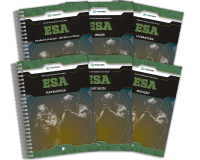IMPERATIVE FORM
A construção verbal utilizada aqui é o “base form”, forma básica, que é o infinitivo do verbo sem a utilização de “to”. Nessa estrutura também não teremos a participação de sujeito, sendo a oração, na afirmativa, iniciada pelo próprio verbo.
A forma imperativa é utilizada nos seguintes casos
- Ordens
Exemplo:
Do your homework
Clean your room
Be quiet
- Instruções
Exemplo:
Turn left to find the parking lot
Add one tea cup of sugar
Open the briefcase carefully
- Conselho
Exemplo:
Be careful
Access this website. They have better prices
Take care of yourself
- Pedido
Exemplo:
Please, stop talking loudly
Please, help me with these bags
Please, get ready
- Oferecimento
Exemplo:
Have some beer
Help yourself
Get some rest on the couch
Em orações negativas temos o acréscimo do auxiliar de negação “do not”, que também pode ser usado em sua forma abreviada “don’t”, ficando a estrutura DO NOT/DON’T + VERBO PRINCIPAL (FORMA BÁSICA) + COMPLEMENTO
Exemplo:
Do not/Don’t arrive late
Do not/Don’t play video games past ten o’clock
Do not/Don’t be unprepared for the meeting
Do not/Don’t give up on your mission
Do not/Don’t try to trick me
APROFUNDANDO
O modo imperativo normalmente não possui sujeito na estrutura, mas é possível usar um substantivo ou pronome para deixar claro para quem a fala é direcionada.
Relax, everybody.
Emily come here.
Em negativas:
Don’t you believe it!
Don’t you dare.
Don’t anybody say a word.
OBS.: com ALWAYS e NEVER
Always remember what I told you.
Never speak to me like that again.
SUBJUNCTIVE MOOD
Usado após verbos como SUGGEST, RECOMMEND, ASK, INSIST e adjetivos como VITAL, ESSENTIAL, IMPORTANT para expressar sugestões, ordens, recomendações.
VERBO NA BASE FORM
It’s essential that every child have the same educational opportunities.
It was important that you contact Adam as soon as possible.
The judge recommended that Simmon remain in prison for life.
It is desirable that he not leave school before eighteen.
Também usado para expressar uma ideia hipotética.
VERBO NO SIMPLE PAST
I wish I were a nerd.
Carol wishes she were twenty years old again.
If I were in your place, I wouldn’t do it.
If we were in London, we would meet you.
INFINITIVO
Forma: to spend ou spend, to answer ou answer.
Negativa: not to spend / not to answer.
O infinitivo é, normalmente, identificado pelo uso do “to” antes do verbo.
Exemplo:
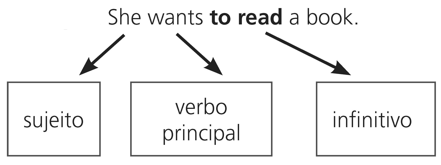
Uso do infinitivo com o “to”
I. Após os verbos afford, agree, appear, arrange, care, decide, expect, fail, forget, happen, hope, learn, like, love, manage, need, prepare, promise, prove, refuse, remember, seem, swear, turn out, want.
Exemplos:
She decided to go to Mexico City.
Did Alex refuse to pay the bill?
II. Indicando fnalidade (neste caso, pode aparecer a expressão “only”).
Exemplos:
They’ll go to São Paulo to buy some tools.
The teacher entered the room only to talk to the student.
III. Após numerais ordinais (the frst, the second, the last…), depois dos advérbios what, how, where, why, which.
Exemplos:
Don’t let me be the last to know about your entrance to EFOMM.
You didn’t know what to offer to our guests, did you?
IV. Após adjetivos ou substantivos precedidos (ou não) de adjetivos.
Exemplos:
I’m pleased to meet you.
It was a terrible night to be out in.
V. Verbo como sujeito da oração
Exemplos:

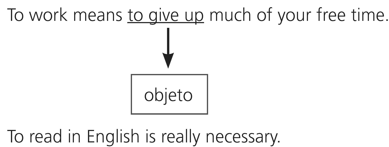
Observação: Em alguns casos, o infinitivo é apenas representado por to (especialmente quando usados com os verbos hate, like, love, try e want).
Exemplos:
Did you visit Sugar Loaf when you were in Rio?
Unfortunately not. I wanted to, but I didn’t have enough time.
Have you booked us a table?
I’ve tried to, but it was impossible.
Uso do infinitivo sem o “to”
I. Após as formas auxiliares will, shall, would, do/does/did, can/ could, may / might, must should. Ought to, have to, (be) going to, would rather e had better.
Exemplos:
They could play any musical instrument.
Unfortunately not. I wanted to, but I didn’t have enough time.
II. Após os verbos “make” e “let”.
Exemplos:
Ana makes me feel very happy.
Let me tell you about my new job.
III. Após as expressões but e except.
Exemplos:
Since you’ve let her, she’s done nothing but cry.
She will do anything except forgive your treason.
GERÚNDIO
Forma: Forma verbal terminada em –ING.
Reading/ playing/ quitting
Negativa: not reading / not playing/ not quitting
I. Verbo como sujeito da oração
Exemplos:

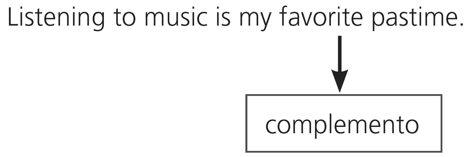
Após os verbos hate, love, like, prefer, podemos utilizar ING ou TO INFINITIVO como complemento.
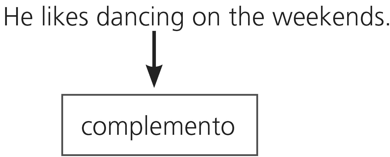
II. Após preposições
Exemplo:
I often relax by playing the guitar.
Good musicians improve by practicing every day.
III. Em frases compactas que expressam proibições
Exemplo:
No smoking/ No trespassing
IV. Após os verbos

Exemplos:
Keep practicing and you’ll reach perfection.
Do you mind opening that door for me?
- Caso especial
TO STOP = PARAR
STOP + INFINITIVE = PARAR PARA
STOP + GERUND = PARAR DE
Exemplos:
I stopped to drink some water and continued my explanation.
I stopped drinking alcohol. It is a bad habit.



